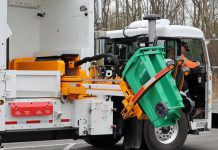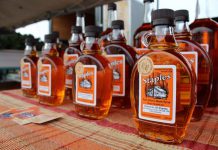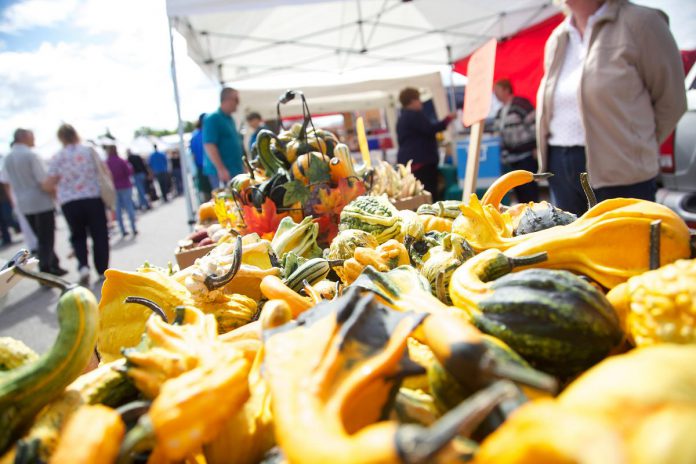
Increasing sales of locally grown and processed food to local restaurants, stores and institutions has a positive economic impact on rural and urban communities. It creates jobs, unique culinary experiences for visitors, and improves the viability of businesses.
Making these connections may seem win-win and straightforward, but it can be a challenge to organize and implement. That is why the Kawartha Region Local Food Wholesale Project was created.
Developed by Peterborough & the Kawarthas Economic Development (PKED) and City of Kawartha Lakes Economic Development, the project is helping to grow local farm and food businesses. It is getting more local food onto plates, shelves, and menus by building skills, relationships, and new business models. The project is already getting results with more sales between participants and steps taken towards the development of a ‘food hub’ that can enable producers and buyers to better plan, aggregate, and deliver local food.
The multi-phase project is funded in part by the Ontario Government, through the Rural Economic Development Program. With an objective of scaling up the local food supply and create a wholesale local food market, the 12-session training component of the project has been completed, with the business coaching and pilot food hub components scheduled to continue until the end of the project in December 2025.
“This project is a wonderful example of innovation that our government is proud to support through the Rural Economic Development program,” says Lisa Thompson, Ontario Minister of Rural Affairs. “Without a doubt, the Kawartha Region Local Food Wholesale Project is enabling economic development and entrepreneurship across the region through their local training program and available coaching.”
“Local food connects us with the land and improves our relationship to nature,” says Gabi Dragomir, Rural Economic Development Officer with PKED. “There’s something valuable about knowing where your food comes from, having a relationship with the farmer that grew it or raised it, and being able to share the stories.”
“Local food creates wealth and has real economic impact,” adds Jamey Coughlin, Director of Business Attraction, Retention and Expansion at PKED, “More sales means good jobs. More sales enables investment in infrastructure like greenhouses, which extend the season.”
Coughlin notes “The best way to preserve local farmland is to ensure that local farms are financially viable.”
Launched in the fall of 2023, the project includes 48 participants with a wide range of experiences, skills, and talents. The producer group has representatives from maple syrup, livestock, vegetable and microgreen farms. The buyer group has representation from restaurants, hotels, retailers, and cafés.
“Our region’s agriculture sector, food service and culinary tourism scenes are varied and diverse,” says Dragomir. “We are not a monoculture. We are exciting and have a lot to offer.”
Phase 1: Producer and Buyer Training
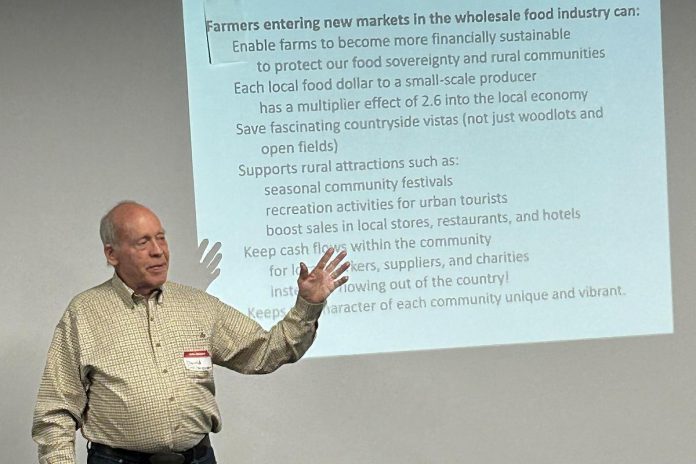
During February and March, producer training sessions were led by David Cohlmeyer, founder and former owner of the award-winning Cookstown Greens. The Simcoe County organic farm was a pioneer in the growing and marketing of high-end vegetables to the restaurant scene in the GTA. Content included specialty crop planning, post-harvest handling, and customer service.
Training sessions for buyers were led by chef Gary Hoyer of Sustainable Good Food Consulting. As a restaurateur, chef, and general manager in the food service industry, Hoyer specializes in retail and institutional local food systems, purchasing, and preparation. Topics such as building seasonality into a menu, food costing and plate pricing, and food safety were covered during the sessions.
“Some producers have never sold wholesale before,” Dragomir says. “They were eager to learn the ins-and-outs, while others were excited to tailor their offerings, re-examine their pricing, and in general learn what different buyers are looking for. The buyers were looking to build connections within the farming community and tell those stories to diners.”
The program was open to businesses from the City of Peterborough, Peterborough County, and the City of Kawartha Lakes. Producer and buyer training sessions were held concurrently so participants could make connections and forge business partnerships.
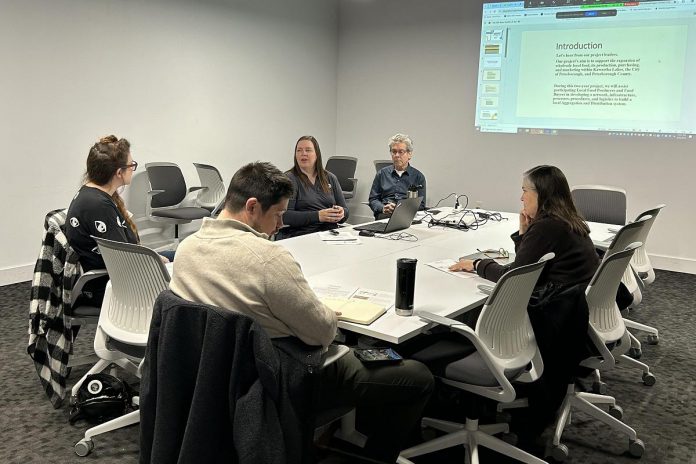
“Having the opportunity to be a part of the project has been quite informative and helpful for a small-scale local food producer,” says Matt Anderson, owner of Chemong City Greens in Peterborough. “I’ve been impressed by the actionable content presented at the seminar and the guest speakers’ industry experience and expertise.”
At the final training session, a potluck was held to share the delicious local goods and build business connections. Participants brought everything from desserts made with maple syrup to bread puddings, local preserves, a wide variety of vegetables, and salads with freshly sprouted kale.
The development of new producer and buyer relationships is a key step for the third phase of the project, which saw the launch of a working group to explore the development of a more formalized local food aggregation and distribution system, commonly known as a local wholesale food hub (see Phase 3).
Phase 2: On Site Coaching and Mentoring
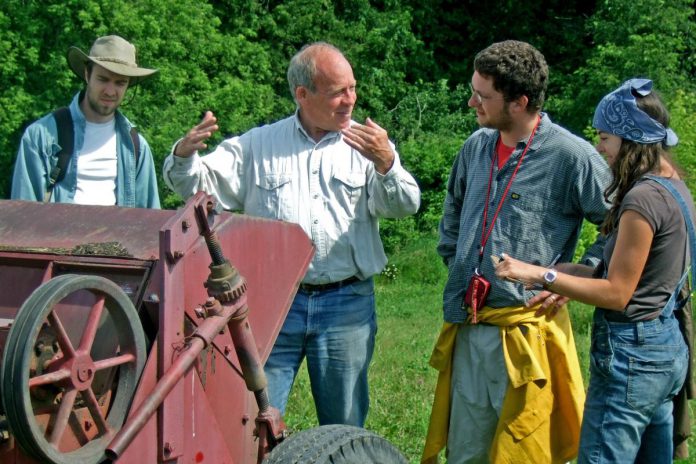
Throughout the spring more than 20 producers had the opportunity for on-farm, one-on-one coaching sessions with the consultant David Cohlmeyer.
The mentorship has built confidence and helped producers and get ready for wholesale.
“I can’t believe I was able to host David Cohlmeyer on my farm,” said Josh Blank of Carrot Tops Organics, “He is a farming legend, a rock-star and has so much experience. He was really impressed by my artichokes.”
Phase 3: Developing a Local Food Hub
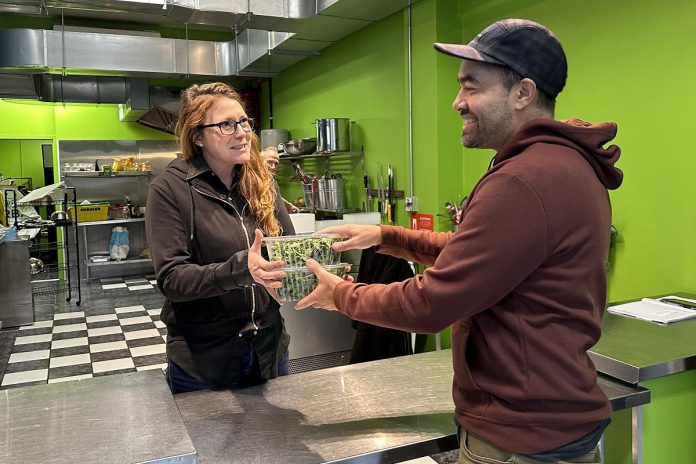
Farmers’ markets and community shared agriculture boxes can be great channels to sell directly to consumers. But to sell more local food to restaurants, stores and institutions is different. New methods and partnerships may need to be used to scale up production, organize product from multiple farms and deliver to customers.
Many of the producers and buyers participating in the project have come together to form the Wholesale Food Hub Steering Committee, which has the mission to “create an efficient planning, aggregation and distribution model that increases the volume of wholesale food transaction between local producers and buyers and facilitates collaboration.”
The steering committee meets every three weeks, supported by the consultant Gary Hoyer, and the project coordinator Erika Inglis. They are assessing existing local food hub models across North America to develop a local food hub structure suited for the needs of the Peterborough and Kawartha Lakes region.
The collaboration leverages the strengths, experiences, business connections, and assets of the participants. Several producers have been looking for innovative ways to sell to wholesale for many years and are thrilled to bring the project to fruition.
Melissa Pearce, owner of Treasures by the Locks in Fenelon Falls, is one of the participants.
“Being able to direct people to the source, or to folks that work with the source instead of the grocery store, it’s just better,” she says. “A centralized hub for all of this sounds like a dream come true.”
Next Steps
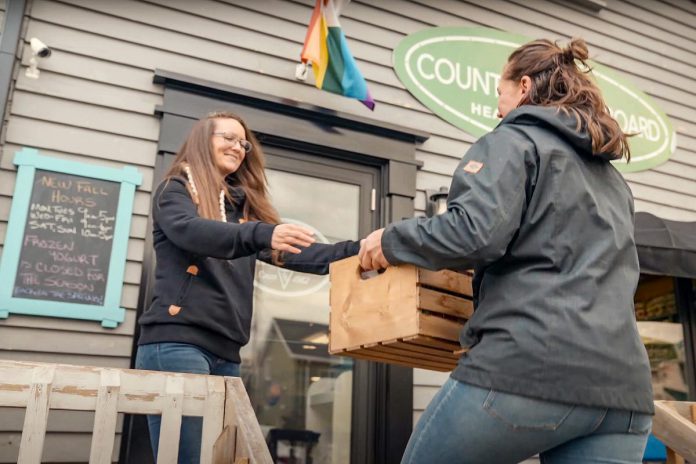
The exact form of a food hub is still to be determined. It could be a new physical space, adding a new purpose to an underutilized space coupled with a multi-farm ordering website or something else. What matters is that producers and buyers are collaborating, organizing, and creating a new model that can deliver more value for both farmers and buyers.
Even though the project lead, PKED, has announced dissolution as of December 31, 2024, the important, multi-year, and multi-phase work will continue. As is the case with other regional, collaborative projects, PKED is making efforts to safeguard and, if needed, rehome. Details are still being finalized, but PKED is working closely with partners in the City of Kawartha Lakes and the participants themselves. Coordination support offered by the Kawartha Region Local Food Wholesale Project will be critical to nurture, organize, and incubate the effort.
“This project is like growing a fruit tree: we’ve planted the seeds with the training sessions, we are establishing our roots with mentoring and the work of the steering committee, and we expect to see the fruits of our labour starting next season with new aggregation and distribution capabilities,” says Dragomir. “I’m confident we’ll have a sustainable local food hub — a sustainable enterprise benefiting producers, distributors, retailers, institutional buyers and the community. It will bear fruit year after year.”
To participate in the pilot local food hub or to learn more about the project, please contact Erika Inglis, Project Coordinator – RED Project at PKED, at 705-743-0777 ext. 2119 (mobile 705-872-6529) or at einglis@investptbo.ca.
This story was published in partnership with Peterborough & the Kawarthas Economic Development.





